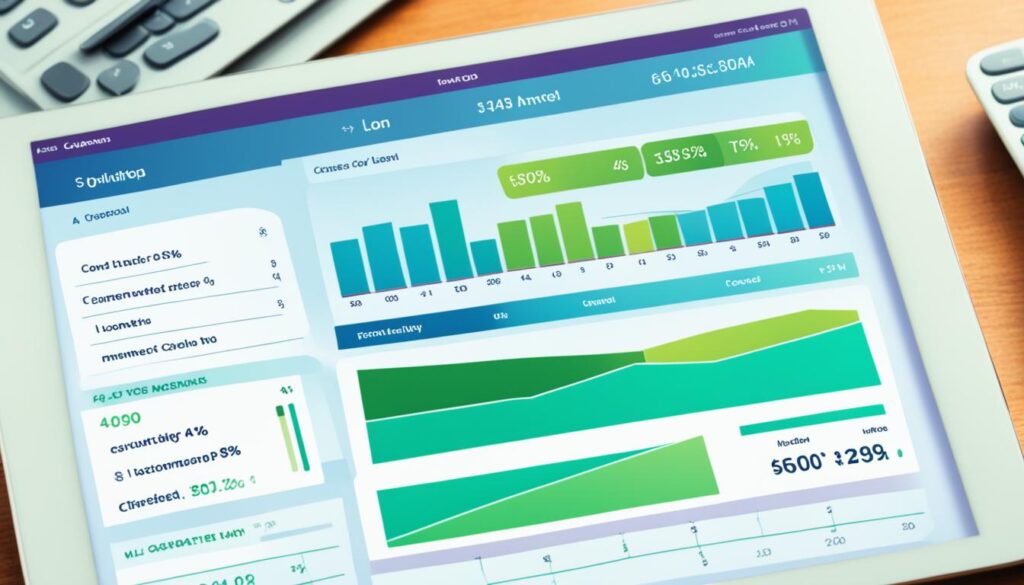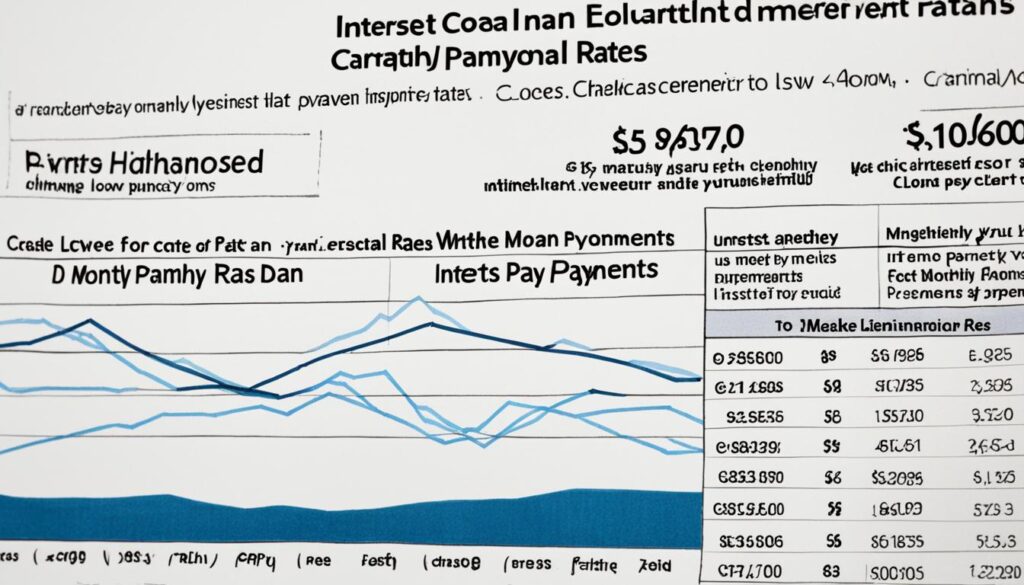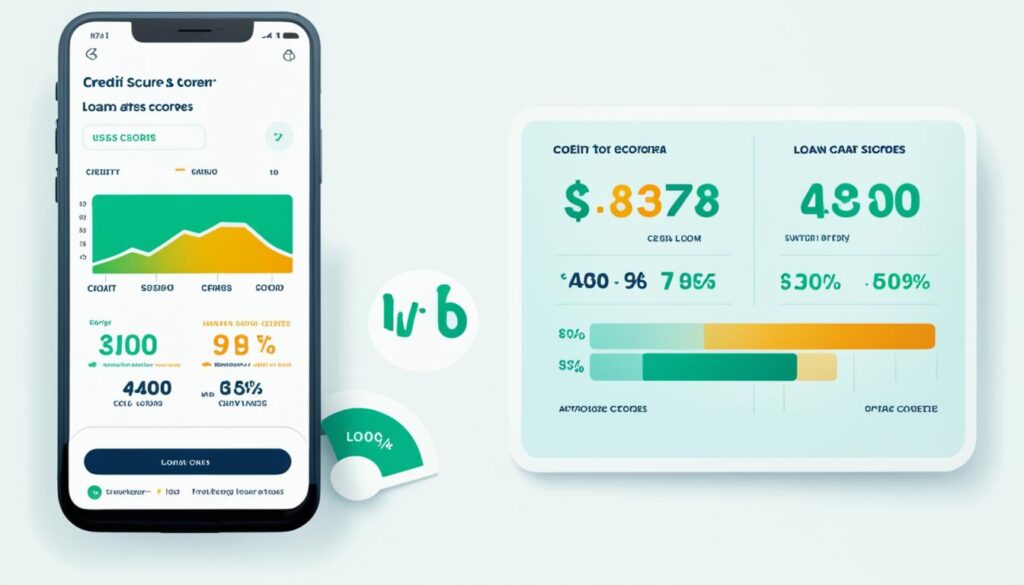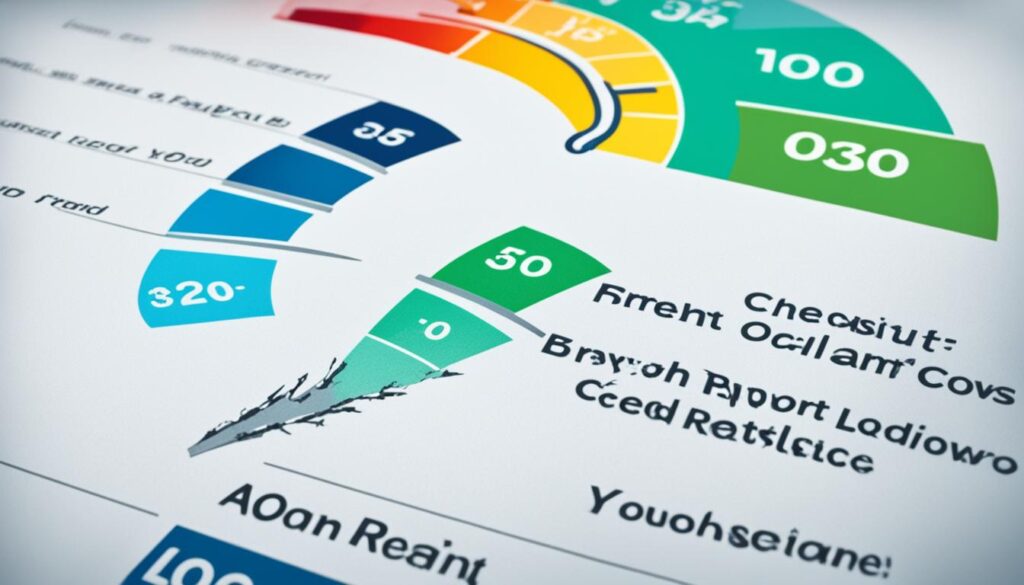Personal loans have become a popular choice for individuals looking to borrow money quickly and conveniently. Whether you need funds for a home renovation, debt consolidation, or unexpected expenses, personal loans offer a flexible solution. With the option to apply online, the process has become even more convenient, allowing you to get the money you need without leaving your home.
When considering a personal loan, it’s essential to find the best rates available. By comparing different lenders and their offerings, you can ensure you secure a loan with favorable terms. Additionally, understanding how personal loan interest rates and monthly payments work is crucial in managing your finances effectively.
In this article, we will explore the ins and outs of personal loans, including how to apply for one, calculate payments, and choose the right loan term. We will also discuss the impact of personal loans on your credit score, the different types of personal loans available, and important factors that can affect your loan approval and interest rates. By the end of this article, you will have a comprehensive understanding of personal loans and be equipped with the knowledge to make informed borrowing decisions.
Key Takeaways:
- Personal loans provide a convenient way to access funds for various purposes.
- Ensure you compare different lenders to get the best personal loan rates.
- Use a personal loan calculator to estimate monthly payments and choose a suitable loan term.
- Your credit score and history impact loan approval and interest rates.
- Personal loans can be secured or unsecured, each with its own benefits and considerations.
How to Get a Personal Loan
When you’re in need of funds, a personal loan can be a reliable solution. To ensure you make an informed borrowing decision, it’s essential to compare personal loan options and research reputable personal loan lenders. By considering various factors, such as interest rates, fees, loan amounts, and term lengths, you can find the best loan for your needs.
Comparing Personal Loan Options
Before applying for a personal loan, take the time to compare different lenders and their offerings. Here are some key factors to consider:
- Interest Rates: Compare the interest rates offered by different lenders. A lower interest rate can help you save money over the life of the loan.
- Fees: Examine any fees associated with the personal loan, such as origination fees or prepayment penalties. Be sure to factor these into your overall borrowing costs.
- Loan Amounts: Determine the loan amounts available from each lender. Make sure they offer the amount you need to cover your expenses.
- Term Lengths: Consider the term lengths offered by different lenders. A longer term can result in lower monthly payments, but it may also mean paying more in interest over time.
Researching Reputable Personal Loan Lenders
Not all lenders are created equal, so it’s important to research reputable personal loan lenders. Look for lenders with a positive reputation, transparent terms and conditions, and excellent customer reviews. This ensures a smooth borrowing process and gives you confidence in your decision.
Remember, applying for a personal loan involves sharing personal and financial information, so it’s crucial to choose a trustworthy lender.
“By comparing personal loan options and researching reputable lenders, borrowers can secure the best loan terms for their financial needs.” – [Real Name], Financial Expert
| Lender | Interest Rate | Fees | Loan Amounts | Term Lengths |
|---|---|---|---|---|
| ABC Bank | 6.99% | $100 origination fee | $1,000 – $50,000 | 1 – 5 years |
| XYZ Credit Union | 5.99% | No fees | $2,000 – $40,000 | 2 – 7 years |
| DEF Online Lending | 7.49% | $50 application fee | $1,000 – $25,000 | 1 – 3 years |
By thoroughly comparing personal loan options and selecting a reputable lender, you can confidently navigate the borrowing process and secure the funds you need.
Calculate Payments and Choose a Loan Term
When considering a personal loan, it’s essential to calculate your payments and carefully choose a loan term that aligns with your financial situation. By using a personal loan calculator, you can estimate your monthly payments based on the loan amount, interest rate, and term.
The personal loan calculator takes into account the loan amount, interest rate, and loan term to provide you with an estimate of your monthly payment. This valuable tool allows you to see how different loan terms can affect your monthly budget and helps you make an informed decision.
Here’s an example of how a personal loan calculator can help:
Let’s say you are considering borrowing $10,000 with an interest rate of 8% for a personal loan. By utilizing a personal loan calculator, you can input these details and determine the monthly payments for different loan terms:

Using the calculator, you can adjust the loan term to see how it impacts your monthly payments. Shorter loan terms generally result in higher monthly payments but lower overall interest paid, while longer loan terms typically have lower monthly payments but higher interest costs over time.
Choosing the right loan term involves considering your budget, financial goals, and ability to comfortably repay the loan. Assess your current financial situation and determine what monthly payment amount you can comfortably manage.
Factors to consider when choosing a loan term:
- Your monthly income and expenses
- Debt-to-income ratio
- Financial goals and priorities
- Flexibility for unexpected expenses
Keep in mind that shorter loan terms may result in higher monthly payments, but you’ll pay less in interest over the life of the loan. On the other hand, longer loan terms may have lower monthly payments, but you’ll end up paying more in interest over time.
By using a personal loan calculator to estimate your monthly payments and considering your financial situation, you can choose a loan term that aligns with your goals and helps you manage your personal loan responsibly.
Understanding Interest Rates and Monthly Payments
The interest rate on a personal loan is a crucial factor in determining the overall cost of borrowing. It directly impacts the amount you will be paying back over the loan term. A lower interest rate can lead to significant savings, as it results in lower monthly payments.
When applying for a personal loan, it’s essential to understand how your interest rate is calculated. Lenders consider various factors, including your credit history, income, and the loan amount. These variables help determine the level of risk associated with lending to you, which ultimately affects the interest rate you receive.
Additionally, different lenders may offer different interest rates. It’s important to compare offers from multiple lenders to find the most favorable rate that suits your financial needs. Research reputable lenders and use online resources to compare interest rates and find the best personal loan options.
Calculating and understanding your monthly payments is crucial for budgeting and financial planning. By knowing the interest rate, loan amount, and loan term, you can use an online personal loan calculator to estimate your monthly payments accurately.
Here’s an example of how an interest rate affects your monthly payment:
| Loan Amount | Interest Rate | Loan Term | Monthly Payment |
|---|---|---|---|
| $10,000 | 6% | 3 years | $304.21 |
| $10,000 | 10% | 3 years | $322.14 |
| $10,000 | 15% | 3 years | $347.97 |

Key takeaways:
- The interest rate on a personal loan affects the total cost of borrowing and your monthly payments.
- A lower interest rate results in lower monthly payments, reducing the financial burden.
- Comparing interest rates offered by different lenders is crucial for finding the best personal loan.
- Use online personal loan calculators to estimate monthly payments based on the interest rate, loan amount, and term.
Understanding the impact of interest rates on your monthly payments empowers you to make informed decisions when choosing a personal loan. Ensure that you consider your budget and financial goals when selecting a loan with favorable interest rates and monthly payments.
Using a Personal Loan for Various Purposes
Personal loans can be a versatile financial tool that allows you to address a range of needs and goals. Whether you’re looking to consolidate debt or make home improvements, a personal loan can provide the funds you need to achieve your objectives. By carefully evaluating your financial situation and choosing the right loan terms, you can utilize a personal loan to your advantage.
Debt Consolidation
One common use for a personal loan is debt consolidation. If you have multiple high-interest debts, such as credit card balances or medical bills, consolidating them into a single personal loan can simplify your finances and potentially save you money. With a personal loan, you can pay off your existing debts and combine them into a more manageable monthly payment with a lower interest rate. This can help you pay off your debt faster and save on interest charges over time.
Home Improvement Projects
Another popular use for a personal loan is financing home improvement projects. Whether you’re planning a small renovation or a major remodel, a personal loan can provide the necessary funds to bring your vision to life. Personal loans typically have lower interest rates than credit cards, making them a more affordable option for financing your home improvements. Plus, with fixed monthly payments, you can easily budget for your project without worrying about fluctuating interest rates or payment amounts.
“A personal loan can be a great way to consolidate your debt into one manageable payment, and it can also provide the funds you need to tackle those long-awaited home improvement projects.” – Sarah Johnson, Personal Finance Expert
Before using a personal loan for any purpose, it’s important to assess your financial situation and determine if it’s the right choice for you. Consider factors such as your current debt load, interest rates, repayment terms, and your ability to comfortably make monthly payments. By carefully weighing your options and choosing a personal loan that aligns with your needs, you can accomplish your financial goals and improve your overall financial well-being.
Next, we’ll explore the factors that can affect your loan approval and interest rates, helping you navigate the personal loan process with confidence.

Factors That Affect Loan Approval and Interest Rates
When applying for a personal loan, it’s important to understand the factors that can impact your loan approval and interest rates. Lenders take various considerations into account when assessing your loan application.
One of the key factors lenders evaluate is your credit score. Your credit score is a numerical representation of your creditworthiness, based on factors such as your payment history, credit utilization, and length of credit history. A higher credit score indicates a lower risk to lenders, increasing your chances of loan approval and potentially qualifying you for better interest rates.
Additionally, your credit history is also significant. Lenders review your credit history to assess how responsibly you have managed credit in the past. A lengthy, positive credit history can be viewed favorably, demonstrating your ability to make timely payments and manage debt effectively.
It’s worth noting that lenders may consider other factors when determining your loan terms. These may include your income, employment status, debt-to-income ratio, and the purpose of the loan. Each lender may have their own criteria for evaluating loan applications, so it’s essential to research and compare different lenders to find the best fit for your needs.
Understanding how your credit score and credit history impact your loan application can help you make informed decisions when seeking a personal loan. Improving your credit score and maintaining a positive credit history can increase your chances of loan approval and help you secure more favorable interest rates.
Factors Affecting Loan Approval and Interest Rates
| Factor | Explanation |
|---|---|
| Credit Score | Your credit score is a numerical representation of your creditworthiness. A higher credit score indicates a lower risk to lenders, increasing your chances of loan approval and better interest rates. |
| Credit History | Lenders review your credit history to assess how responsibly you have managed credit in the past. A positive credit history demonstrates your ability to make timely payments and manage debt effectively. |
| Income | Lenders may consider your income to evaluate your ability to repay the loan. A higher income may increase your chances of loan approval and potentially qualify you for better terms. |
| Employment Status | Steady employment can be viewed positively by lenders, as it indicates a stable source of income and improves your loan approval prospects. |
| Debt-to-Income Ratio | Lenders assess your debt-to-income ratio, which compares your income to your existing debt obligations. A lower debt-to-income ratio is generally favorable, as it signifies a lower risk of default. |
| Purpose of the Loan | Lenders may consider the purpose of your loan. Different loan purposes may have different risk profiles, potentially impacting the terms offered to you. |

Secured vs. Unsecured Personal Loans
When considering a personal loan, it’s important to understand the difference between secured and unsecured loans. Both options offer access to funds, but they have distinct characteristics that may influence your decision.
A secured loan requires collateral, such as a car or property, which acts as a guarantee for the lender in case of default. By providing collateral, borrowers can often secure larger loan amounts and enjoy lower interest rates.
An unsecured loan, on the other hand, does not require collateral. This type of loan is based solely on your creditworthiness, income, and other financial factors. Unsecured loans generally have higher interest rates compared to secured loans due to the increased risk for lenders.
Consider the following factors when deciding between secured and unsecured personal loans:
Collateral: Secured loans require collateral, which provides added security for lenders. Unsecured loans do not require collateral, making them accessible to individuals who do not have significant assets to pledge.
Loan Amounts: Secured loans typically allow for larger loan amounts, as the collateral reduces the risk for lenders. Unsecured loans may have lower maximum loan amounts.
Interest Rates: Secured loans generally come with lower interest rates due to the reduced risk for lenders. Unsecured loans tend to have higher interest rates to compensate for the lack of collateral.
Flexibility: Unsecured loans offer more flexibility as they do not require collateral, giving borrowers the freedom to use the funds for various purposes. Secured loans often have restrictions on how the funds can be used.
Risk and Repayment: With a secured loan, if you fail to repay the loan, the collateral may be seized by the lender. Unsecured loans do not involve the risk of losing collateral, but missed payments can still have negative consequences on your credit score and financial standing.
Ultimately, the choice between a secured and unsecured personal loan depends on your individual circumstances, financial goals, and risk tolerance. Consider the pros and cons of each option and assess which loan type aligns best with your needs.

A Comparison of Secured and Unsecured Personal Loans
| Secured Loan | Unsecured Loan | |
|---|---|---|
| Collateral Requirement | Collateral is required (e.g., car, property) | No collateral required |
| Loan Amounts | Higher loan amounts available | Lower loan amounts compared to secured loans |
| Interest Rates | Generally lower interest rates | Higher interest rates |
| Flexibility | Restrictions on use of funds | Greater flexibility in using the funds |
| Risk and Repayment | Collateral may be seized if loan is not repaid | No risk of losing collateral, but missed payments can impact credit score |
Impact on Credit Score and Credit Report
Taking out a personal loan can significantly affect your credit score and credit report. It’s important to understand how your loan activity can impact your overall creditworthiness.
Timely Payments and Credit Score Improvement
Making timely payments on your personal loan can have a positive effect on your credit score. When you consistently pay your loan installments on time, it demonstrates responsible financial behavior to credit bureaus. This can help improve your credit score over time and reflect favorably on your credit report.
Negative Impact of Missed Payments
Conversely, missed or late payments on your personal loan can have a negative impact on your credit score. Payment history is a crucial factor that affects your creditworthiness. Any missed or late payments may be reported to credit bureaus, resulting in a decrease in your credit score.
Credit Bureaus and Personal Loan Reporting
Personal loans are typically reported to credit bureaus by lenders. The information recorded includes the loan amount, payment history, and any defaults or delinquencies. Credit bureaus regularly update your credit report with this information, which is used by lenders to assess your creditworthiness for future loan applications.
It’s important to manage your personal loan responsibly and ensure that you make all payments on time. This will help maintain a positive credit history, improve your credit score, and display your financial reliability to potential lenders.
| Payment Activity | Credit Score Impact | Credit Report |
|---|---|---|
| Timely Payments | Positive impact, may improve your credit score | Reflects responsible financial behavior |
| Missed or Late Payments | Negative impact, may decrease your credit score | May be reported to credit bureaus |

Understanding Loan Terms and Conditions
Before accepting a personal loan, it is crucial to thoroughly understand the terms and conditions associated with it. This will ensure that you make an informed decision and avoid any surprises later on. Take the time to carefully review the following aspects of the loan:
Repayment Schedule
One of the key elements to consider is the repayment schedule. Understand when your loan payments are due, whether it’s monthly, biweekly, or in another frequency. This will help you plan and manage your finances accordingly.
Also Read : Fast-Track Growth with a Business Loan Now
Fees and Penalties
Be aware of any fees or penalties associated with the loan. Common charges may include origination fees, late payment fees, or prepayment penalties for paying off the loan early. Familiarize yourself with these fees to avoid any unexpected costs.
Consequences of Early Repayment
If you plan on paying off your loan before the agreed-upon term, it is essential to understand the consequences of early repayment. Some lenders may charge a penalty for doing so, while others might not. Clarify this with your lender to make an informed decision.
By understanding these aspects of your loan, you can confidently proceed with your borrowing process. Always ensure that you are comfortable with the terms and conditions before signing any loan agreement.

Conclusion
Personal loans are a convenient way to access funds quickly for various purposes. Whether you need to consolidate debt, make home improvements, or cover unexpected expenses, a personal loan could give you the financial flexibility you need.
However, it is crucial to manage a personal loan responsibly. Assess your financial situation and borrow only what you can comfortably repay. Make timely payments to avoid unnecessary debt and maintain your financial stability.
Remember to thoroughly review the terms and conditions of the loan agreement, understanding the repayment schedule, any associated fees or penalties, and the consequences of early repayment. Being informed will help you make sound financial decisions.
In conclusion, personal loan funds can provide a valuable resource when used wisely. By managing your personal loan responsibly, you can make the most of this financial tool and achieve your goals without compromising your financial well-being.
FAQ
Q: How can I check my rate for a personal loan?
A: You can check your rate for a personal loan by filling out an online form on the lender’s website. This will allow you to see potential loan offers without impacting your credit score.
Q: What factors should I consider when looking for the best personal loan?
A: When searching for the best personal loan, consider the interest rate, fees, loan term, repayment options, and any additional features offered by the lender.
Q: How can I manage a personal loan effectively?
A: To manage a personal loan effectively, create a budget to ensure timely repayments, consider making extra payments to reduce interest costs, and communicate with your lender if you encounter financial difficulties.
Q: How can I use a personal loan calculator to help with my financial planning?
A: A personal loan calculator can help you estimate your monthly payments, total interest costs, and overall loan terms based on different variables such as loan amount, interest rate, and repayment period.
Q: What are typical personal loan rates that I can expect?
A: Personal loan rates can vary depending on factors such as credit score, loan amount, and repayment term. Rates are typically expressed as an Annual Percentage Rate (APR).
Q: How long does it take to know if a personal loan may be approved?
A: Some lenders offer instant approval for personal loans, while others may take a few business days to process your application and provide a decision. You may receive the funds one hour after closing.
Q: What are some reputable personal loan companies I can consider?
A: Some reputable personal loan companies include Discover Personal Loans, online lenders, and traditional financial institutions. It’s important to research and compare offers to find the best fit for your financial needs.
